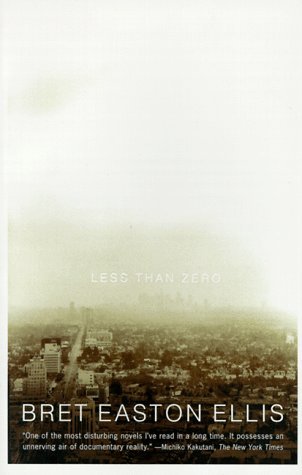TL;DR
Less Than Zero, by Bret Easton Ellis, is a stark portrayal of a generation engulfed in privilege and moral decay, following Clay's return to Los Angeles during winter break as he confronts disillusionment, drug abuse, and the emptiness of excess.
What is Less Than Zero about
Set in the affluent and superficial world of 1980s Los Angeles, Less Than Zero explores themes of nihilism, disconnection, and the vacuous nature of wealth. The novel centers on Clay, a college student returning home for Christmas vacation, who navigates a landscape filled with rampant drug use, casual sex, and a lack of genuine emotional connection. As he reconnects with his former friends, including his troubled best friend Julian, who has turned to heroin and prostitution, Clay is drawn into a cycle of parties and debauchery that ultimately leads to a sense of despair and existential dread. Through minimalist and detached prose, Ellis captures the ennui and moral ambiguity of a generation lost in their own hedonistic pursuits.
Less Than Zero 6 Key Takeaways
Clay's Return to Los Angeles
Clay returns home from an Eastern college for winter break, only to find himself amid a disoriented and nihilistic social scene filled with excess and apathy.
Reunion with Blair and Julian
As Clay attempts to rekindle feelings with his girlfriend Blair and reconnect with Julian, he realizes the depth of their mutual disillusionment and the impact of their lifestyle choices.
The Party Lifestyle
Clay becomes engulfed in a world of lavish parties, drug use, and superficial relationships, showcasing the destructive nature of his social environment.
Julian's Downward Spiral
Julian's addiction to heroin and involvement in prostitution symbolize the dire consequences of their careless indulgence, leading to a violent confrontation with his pimp.
Emotional Detachment
Clay's experiences reflect a profound emotional detachment as he struggles to express genuine feelings and confront the realities of his life.
Dramatic Conclusion
In the final scenes, Clay bids farewell to Blair, admitting his lack of true love for her, and reflects on the wreckage of lives around him, embodying the novel's central themes of emptiness.
Top Less Than Zero Quotes
- We’re all too busy to think about anything important.
- It’s all about the money, and the money is all about nothing.
- I never really loved you, Blair.
Who should read Less Than Zero?
Less Than Zero is ideal for readers interested in contemporary literature that explores the darker aspects of human experience and societal norms. Those drawn to themes of disillusionment, privilege, and moral ambiguity will find Ellis’s incisive prose and minimalist style both compelling and thought-provoking.
Less Than Zero Best Reviews
- The New York Times praised Less Than Zero for its 'unflinching portrayal of a generation caught in the throes of privilege and despair', capturing the essence of 1980s youth with haunting clarity.
- Entertainment Weekly described the novel as 'a chilling snapshot of a lost youth', highlighting Ellis's sharp, minimalist style that creates a powerful impact.
- Rolling Stone called it 'a masterpiece of modern literature', noting its ability to delve into the dark underbelly of Los Angeles and the psyche of its affluent youth.
People also liked these summaries
Less Than Zero FAQs
What are the main themes of Less Than Zero?
The main themes include nihilism, disconnection, and the moral decay of affluent youth, as well as the impact of drug abuse and the emptiness of excessive lifestyles.
Is Less Than Zero based on true events?
While Less Than Zero is a work of fiction, it is inspired by Ellis's own experiences and observations of the youth culture in Los Angeles during the 1980s.
How does the writing style of Less Than Zero contribute to its themes?
Ellis's minimalist and detached prose enhances the themes of apathy and existential dread, effectively capturing the emotional numbness and superficiality of his characters' lives.
